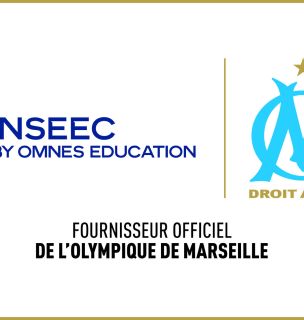The Financial Analyst must follow the changes in the markets
programme director
Why choose the MSc in International Financial Analysis program ?
The academic content of the program is designed to equip participants with the technical expertise and professional skills required for careers in financial analysis. An analyst is driven by the need to gather and interpret corporate data this is precisely why financial analysts are in high demand, whether they specialize in a specific industry sector or a geographic region.
Students receive a technical education aimed at giving them mastery over the collection and analysis of financial, social, and economic data from the markets in which they will specialize. They are primarily trained to work in banks or investment firms.

A 1 or 2 year degree to become an expert in Financial Analysis
- Hourly volume 1st year of MSc: 441 hours
- Hourly volume 2nd year of MSc: 441 hours
Objectives of the programme
The objective of this program is to enable learners to acquire high-level expertise in the field of corporate finance in general and financial analysis in particular. The program is based on an in-depth study of financial, accounting and legal techniques allowing them to acquire solid knowledge essential for high-level professions. The objectives in terms of skills are to be able to :
- Analyze strategic company data
- Control and manage the company’s activity
- Ensuring the sustainability of the company’s activity
- Issue financial recommendations and master communication
In addition to these core competency blocks, the following optional sectoral block is offered :
- Managing financial risks and credit risks.
How to apply for the MSc in International Financial Analysis at INSEEC ?
The required prerequisites
The conditions for accessing the certification system (excluding VAE) are:
- For entry into the 4th year (MSc1) : applicants must have completed a level 6 or equivalent (such as a Bachelor’s degree) in one of the following fields: finance, business management, public administration, economics, or mathematics.
- For entry into the 5th year (MSc2 ) : applicants must have completed a level 6 or equivalent (such as a Master’s 1) in one of the following fields: finance, business management, public administration, economics, or mathematics, with experience in finance.
Want to know more about the MSc in International Financial Analysis?
Sign up for an Open Day!
Would you like to know more about the admission conditions for our programme in MSc in International Financial Analysis?
What are the courses in the Master of Science in International Financial Analysis ?
The courses listed below are provided as examples and may vary slightly depending on the teaching campus. The content of the courses is updated annually to reflect market developments and is revised before each academic year.
1st year courses
CROSS-DISCIPLINARY & FUNDAMENTAL COURSES – 1ST YEAR
BUDGET MANAGEMENT AND DASHBOARD
The objective is to acquire key skills in budget management and reporting. Particular emphasis will be placed on budget architecture, including the implementation of summary documents, project management control and its connection with budget management, as well as the creation and monitoring of dashboards.
CORPORATE STRATEGY AND BUSINESS PLAN
This module aims to teach the creation of a Business Plan: designing a financial project for starting or expanding a business. Several key steps are covered :
- Feasibility study
- Market targeting
- Opportunities and risks
- Strengths and weaknesses
- Communication
- Financial planning and profitability
BUSINESS ENGLISH
- Perfect the techniques of understanding and communication in the English language in a context broader than the field of business English.
SOFTWARE & DECISION SUPPORT TOOLS
- This module aims to deepen students’ IT skills to meet the demands of companies in terms of budgetary or commercial monitoring, project management, personnel management, and communication : Excel, Word, PowerPoint, team collaboration tools, business software.
- Its goal is to develop proficiency in office tools, quickly identify and correct errors, customize existing tools, or create one’s own tools.
BUSINESS GAME
- The business game is conducted using a management simulator.
- Groups of students are responsible for managing a company in real-time.
- All major functions of the company are addressed.
- Students will make decisions aimed at maximizing the company’s profitability.
PROFESSIONAL TOOLS AND METHODS
This module allows learners to enhance their CV and professional presence through various practical exercises (professional simulations, public speaking, etc.) :
- Practical and professional workshops (CV, professional social networks, coaching, etc.)
- As well as career conferences and master classes.
SPECIALIZED COURSES
ACCOUNTING
- General accounting aims to explain the ‘reasons for being’, the main uses, the documents, and the mechanisms of general accounting, notably :
- The purpose, content, and use of the Balance Sheet and the Income Statement of an organization
- The mechanisms that enable the link between these two financial statements
- The accounting entry of the main business transactions
- This introductory module in general accounting has the primary objective of providing every student, regardless of their career plans, with a basic accounting culture to understand the content of financial statements and use them to communicate with accountants.
FUNDAMENTALS OF FINANCIAL ANALYSIS
- Modern tools of financial diagnosis to conduct a comprehensive analysis of the company.
- Tools to support financial diagnosis: analysis of profitability, solvency, and financial structure of the company.
- Study of profitability.
MANAGEMENT CONTROL
- Break-even point calculation and dead point analysis
- Budget management techniques
- Activity monitoring and dashboards
- Analysis and application of management control, cost calculation methods, analysis center methods, national allocation of fixed costs, marginal cost, partial costs.
INTERNAL AUDIT
- Evaluation of operations and the company’s level of control.
- Providing advice and studying tools to contribute to value creation.
- Evolution of the auditor’s profession.
AUDIT & STATUTORY AUDIT
- The seminar covers the tasks of auditing accounts as well as the procedures, tests, methods, and audit tools.
- Presentation of legal audit, general aspects, and implementation of the audit, assessment of internal control, specific checks, and final mission reports.
- Analytical procedures, physical controls, and management declarations.
ADVANCED ACCOUNTING
- Mastery of the accounting procedure.
- Consolidation of financial statements.
- Allocation of profits.
- Capital reduction.
- Valuation of securities.
- Formation of companies.
- Capital increase.
- Convergence of the French GAAP (PCG) towards IFRS standards.
ADVANCED FINANCIAL ANALYSIS
- Mastery of fundamental concepts for making financial forecasts.
- Sources of information, sector analysis, analysis of economic and financial performance, analysis of financial structure and financing methods.
BUSINESS LAW
- Definition of business law. The concept of contracts. Obligations of means and results.
- The concept of legal personality, the functioning of SARL, SA, and SNC.
- Criteria for choosing a business structure.
INTERNATIONAL FINANCIAL STATEMENTS
- Presentation of the IFRS and US GAAP frameworks.
- Comparison of financial flows over time.
- Organization of the accounting framework, conceptual framework of standards, and presentation of financial statements under IFRS/US GAAP.
- Valuation and accounting of financial instruments.
CORPORATE FINANCE
- Investment projects: selection criteria and the real options approach.
- Financing methods: quasi-equity, bond financing, negotiable debt securities, initial public offerings, venture capital.
- Explanatory theories of financing choices.
- Cash management and centralized cash flow management.
CORPORATE TAXATION
- The principles and scope of corporate tax (IS), tax optimization within a group.
- International taxation.
- VAT: principles and mechanisms.
- Special VAT regimes.
- VAT territoriality : rules of VAT territoriality, supply of movable goods, service provision.
- VAT liability : VAT base and its calculation.
E AMF
This hybrid-delivered module will provide an understanding of the role of the Financial Markets Authority in regulating and supervising financial markets through the following topics :
- Financial instruments.
- Crypto-assets and risks.
- Collective investment management.
- Functioning and organization of markets.
- Post-trade and market infrastructures.
- Issuance and securities operations, and finally the accounting and financial fundamentals.
- Financial instruments.
- Crypto-assets and risks.
- Collective investment management.
- Functioning and organization of markets.
- Post-trade and market infrastructures.
- Issuance and securities operations, and finally the accounting and financial fundamentals.
FINANCIAL MATHEMATICS
- Comprendre et maitriser les principes d’actualisation et de capitalisation.
- Calcul des intérêts.
- Comparaison des flux financiers dans le temps.
- Calcul des principaux indicateurs de rentabilité dans un projet d’investissement.
EXAMS & SUPPORT
WRITTEN EXAMS
2nd year courses
FINANCIAL & NON-FINANCIAL STRATEGY
FINANCIAL & STRATEGIC ANALYSIS OF THE COMPANY
- Diagnosis based on individual and consolidated financial statements.
- Study of profitability, solvency, financial structure, and return (ROCE, ROE).
- Analysis of listed and unlisted companies.
CONSOLIDATION OF FINANCIAL STATEMENTS
- Definition of the concept of a group.
- Regulatory and legal framework.
- Scope and methods of consolidation.
- Full consolidation and disclosure.
- Restatement of intra-group transactions and results.
- Presentation of group financial statements.
NON-FINANCIAL ANALYSIS & SUSTAINABILITY REPORTING
- From CSR practices to the implementation of the CSRD.
- European (ESRS) and international sustainability standards.
- In-depth study of E/S/G criteria.
- Analysis of sustainability reporting.
- Ability to conduct a non-financial diagnosis.
- Study of the connectivity between financial and non-financial reporting.
- Connection with sustainability reporting.
- The challenges of double materiality.
INTERNATIONAL ACCOUNTING STANDARDS
- The conceptual framework.
- The presentation of financial statements.
- The content of the main standards.
- The concepts of financial position and financial performance.
- Intangible assets and business combinations.
- The importance of cash flows.
- Impairment tests.
- Financial instruments and the treatment of derivatives under IFRS.
FINANCIAL PERFORMANCE
COMPANY VALUATION & LBO
- Asset-based and goodwill-based methods.
- DCF-based methods.
- Analogous methods.
- From value to price, internal and external factors to the parties involved in the transaction and transfer.
- Study of the fiscal, financial, and social constraints of a transfer.
- LBO (Leveraged Buyout) transactions.
- Establishment of holdings and their impact on cash flow.
- Leveraged financial structuring.
- Governance of companies under LBO.
FORECASTING MANAGEMENT, CASH MANAGEMENT AND EXCHANGE AND CURRENCY RISK
- Budgeting and centralization of intra-group treasury operations.
- Cash management investments and financing.
- The use of derivative products for hedging interest rate and exchange rate risks.
FINANCIAL MARKETS & ASSET MANAGEMENT
- Understanding the organization of equity markets, money markets, and bond markets, from order placement to post-trade operations (delivery, settlement), including trading and order execution.
- Understanding institutional frameworks (AMF, ESMA, SEC, etc.).
- Acquiring valuation techniques and risk management for major financial instruments.
- The crypto-assets market (bitcoin, etc.).
- Portfolio management and SRI (Socially Responsible Investment).
AMF PREPARATION & CERTIFICATION
- Master the technical knowledge required by the financial profession (financial instruments and risk, third-party asset management, functioning and organization of markets, securities issuance and transactions).
- Practice and take the certification exam.
FINANCIAL ENGINEERING
STRUCTURED FINANCING & HIGH-YIELD OPERATIONS
- Complex financial structures designed to meet the financing needs of large companies and projects through bond issuances, securitization, mezzanine financing, and syndicated loans.
- The focus is on risk management, tailored structuring, and optimizing financing costs.
- The challenges of bank and bond debt.
- Public offers (tender offers, exchange offers, etc.) and IPOs.
STRUCTURING & NEGOTIATION OF MERGERS & ACQUISITIONS TRANSACTIONS
- Master the main entities involved in M&A transactions by explaining their key stages.
- Familiarize with the technical vocabulary and understand the documents prepared by the key players in such transactions.
- All stages of a merger and acquisition transaction will be detailed, including the pre-contractual phase and the negotiation phase (conditions precedent, asset and liability guarantees, reiterative agreements).
- A focus will also be made on other forms of M&A transactions (merger, partial asset contribution, spin-off).
PRIVATE EQUITY
- Understand how investment funds operate.
- The institutional environment of private equity.
- The different types of financing structures (SCR, FCPR, etc.).
- Funding for start-ups (business angels, etc.) and the role of fintechs.
- ESG issues in private equity.
- Ethical, green, and social funds, etc.
- Techniques in ICOs (Initial Coin Offerings).
PROFESSIONAL TOOLS & METHODS
- This module allows learners to enhance their CV and professional posture through various activities, including simulations (professional simulations, public speaking, etc.) ;
- Practical and professional workshops (CV, professional social networks, coaching, etc.) ;
- As well as career-focused conferences and masterclasses.
MANAGEMENT OF ORGANIZATIONS & TEAMS
EXCEL, VBA
- Organize data from multiple sources in different formats to build clear dashboards.
- Automate data collection to reduce decision-making time and minimize errors due to re-entry.
- Present data and enhance the visual communication of information.
TEAM & TALENT MANAGEMENT
From recruitment to training, including the implementation of an attractive compensation policy, processes, procedures, and indicators to be set up to ensure effective management of employees and their roles within the company.
TRANSFORMATION AND CHANGE MANAGEMENT
- Understand the strategies to support financial developments within organizations, such as managing restructurings, integrating new financial tools, and ensuring compliance with regulations.
- The focus is on communication, training, and managing stakeholder resistance.
- The goal is to ensure a smooth transition to optimized and sustainable financial practices.
TECHAWAY – DATA PROCESSING & GENAI
- Deepen advanced data analysis using Python and harness the potential of Generative Artificial Intelligence (GenAI).
- Learn how AI techniques can enhance data interpretation and communication through prompt engineering.
- Apply data processing strategies to real-world cases.
- Develop a critical mindset essential for advancing in the field of data.
FINANCIAL RISKS & CREDIT RISKS
CREDIT & RISK MANAGEMENT
- Explores the principles of credit risk management in financial institutions and businesses.
- It covers solvency assessment, credit ratings, financial analysis, and scoring models.
- The focus is on identifying, measuring, and managing default risks, as well as understanding regulatory frameworks (Basel Agreements).
FINANCIAL DATA ANALYSIS
- Utilize quantitative data for financial evaluation and decision-making.
- Study of techniques for processing, visualizing, and statistical modeling applied to financial statements and performance indicators.
- Learn to interpret financial ratios, forecasts, and market trends to master fundamental analysis, auditing, and asset management.
FINANCIAL REPORTING & COMMUNICATION
- The construction of internal and external financial reporting.
- Forms and mediums of financial communication.
- The regulatory environment in force (United States, Europe, etc.).
- The constraints of supervisory authorities (SEC, AMF, etc.).
- The policy of rating agencies. Information and communication indicators.
- Communication with partners.
APPLIED RESEARCH THESIS
- Enable learners to understand the expectations of the applied research thesis.
- Formulate a research problem, build a literature review, choose the study methodology, and make recommendations.
EXAMS & SUPPORT
EXAMS & SUPPORTS
- Written exams
- Thesis defense
What are the intake periods and study schedules ?
Two intake periods are organized each year, in February/March and September/October. To verify the opening of each intake, please contact the admissions office directly.
The schedule of courses may vary depending on the campus and whether the program is taken under an internship agreement (initial) or a professionalization/apprenticeship contract (continuing education).
The apprenticeship contract must be signed for a duration of 12 months (MSc2) or 24 months (MSc1 + MSc2).
For information on the duration of the contract for deferred intake, please contact the admissions office of the campus you are interested in directly.

What are the career opportunities after an MSc in International Financial Analysis ?
- Management Controller / Head of Management Control
- Treasurer / Cash Manager
- Financial Manager
- Chief Financial Officer (CFO)
- Corporate Business Advisor
- Mergers and Acquisitions Advisor
- Investment Banker
- Financial Analyst
- Credit Analyst
- Banking Risk Analyst
- Financial Portfolio Manager
What are the professional skill sets developed ?
The professional certification prepares for the following skill sets :
- Design the financial and non-financial strategy of organizations
- Manage the financial performance of organizations
- Design and implement financial engineering
- Lead organizational transformation and manage teams
In addition to these core skill sets, the following optional sectoral block is offered :
- Manage financial risks and credit risks.
Description of the methods for acquiring the certification through the capitalization of skill sets and/or by correspondence.
Certification is obtained by :
- The validation of four core skill sets common to all programs (achieving a score of 10/20 or higher in each skill set).
- The completion of a minimum of 132 days of work placement during the second year of the program (MSc2).
The professional certification
The professional certification of “Expert in Financial Strategy” at level 7 (EU), codes NSF 313 and 314, issued by INSEEC MSc (CEE-SO, CEE-RA, CEFAS, CEE-M, CEE-OUEST, MBA INSTITUTE, ADEFI FORMATION), registered under number 40177 in the RNCP (National Directory of Professional Certifications) by decision of the Director General of France Compétences on January 31, 2025.
The certification is awarded through the capitalization of all skill sets. Each skill within a block must be validated in order to obtain the skill block. Partial validation of a block is not possible. It is also accessible through the Validation of Prior Learning (VAE).
You can find the skill sets associated with this RNCP title by clicking here.
What are the teaching methods ?
Teaching methods
- Lectures and interactive courses
- Simulations through collective and/or individual case studies carried out by students
- Conferences and seminars with a pedagogical focus
Evaluation methods
- Individual or group case studies
- Individual and/or group oral presentations
- Individual and/or group reports
- Applied research thesis with individual defense
Methods and tools
- The evaluation methods are conducted in person, either through continuous assessment or final exams in the form of written tests.
What is the 2025/2026 tuition to enter the programme?
FALL INTAKE – 2025
Initial training :
- MSc1 : €11,850
- MSc2 : €13,500
Apprenticeship program:
- 24 months : €23,850 before tax
- MSc2 : €14,250 before tax
International students pack
Mandatory fee of €700 for exclusive support services for international students living outside the European Union.
SPRING INTAKE – 2026
Initial training :
- MSc1 : €11,850
- MSc2 : €13,500
Apprenticeship program:
- 24 months : €23,850 before tax
- MSc2 : €14,250 before tax
International students pack
Mandatory fee of €700 for exclusive support services for international students living outside the European Union.
VAE/VAP
- VAE : €4,800 before tax
- VAP : €850 before tax
International students pack
Mandatory fee for exclusive support services for international students living outside the European Union.
- Fall intake (2025) – September/October: €700
- Spring intake (2025) – February/March: €700
Application fee
The application fee is €80.
What kind of financial aid is available ?
INSEEC offers several financial aid schemes :
- The alternating rhythm, in internship or work-study contracts
- The right to training via the CPF
- Partnerships with banking institutions listed at INSEEC
KEY FIGURES FOR THE RNCP TITLE NO°35007 "EXPERT IN FINANCIAL ANALYSIS"
86%
National success rate – Class of 2024
95%
Presentation Rate – Class of 2024
87%
Overall Integration Rate (378 respondents out of 479) – Class of 2023
93%
Satisfaction Rate at 6 Months – Class of 2023
The details are available in this documentprovided to you (national results and by regional certifier).
What is the disability policy at our school ?
The OMNES Education group places special emphasis on the societal environment, including the aspect of disability. Indeed, we believe that students with disabilities should not face obstacles in continuing their studies or starting a professional career. We support them by facilitating access to facilities, providing personalized advice, and offering tailored accommodations throughout their academic journey.
Accessibility of premises: all our campuses are accessible to people with disabilities.
To learn more about INSEEC’s disability policy, click here.
Contacts for disability referents by campus:
- Bordeaux : Maxime DOUENS – mdouens@inseec.com
- Lyon : Anissa GASMI – agasmi@inseec.com
- Rennes : Laura LE CALVEZ – llecalvez@omneseducation.com
- Paris : Farid HAMAD – fhamad@inseec.com
- Chambéry : Marianne FERLAY – mferlay@inseec-edu.com
- Marseille : Océane VALOTTI – ovalotti@omneseducation.com
- Toulouse : Amanda MARNEIX – amarneix@omneseducation.com
News

June 2024
INSEEC hosted the CFNews Grands Prix de la Croissance Externe Sud Ouest for the second year running
Read more





